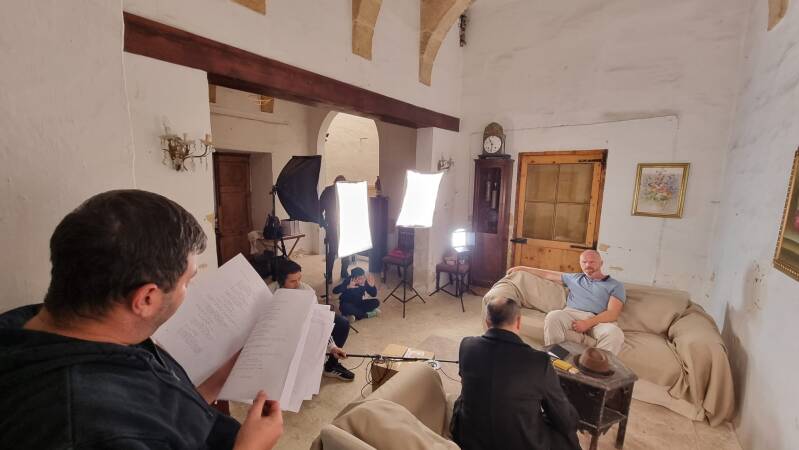Identity
Release Date: April 2025
When tourist Jason McMann vanishes without a trace, Inspector Borg is called in to investigate. But as he questions locals and fellow travelers, he finds an unsettling pattern—almost no one seems to remember McMann at all. Borg must unravel the truth as now the whole country is watching.
Film duration 29min
Awards and Festival Selection
New York Monthly Film Festival - April - Award Winner for Best Short Film
Monza Film Fest - Bimonthly Winner - Award Winner for Best Noir
Athens International Monthly Art Film Festival - Winner Best Atmosphere
Rome Prisma Film Awards - Monthly Pick
Best Hollywood Day Short Film Festival - Winner Best Male Director

Film Review
Prisma Rome Independent Film Festival
JUDGE FEEDBACK
Set against the sun-bleached, labyrinthine charm of Malta, Identity transforms the classic “missing person” trope into something stranger and more unsettling. Here, a man’s disappearance erases not only his physical presence but his very existence from the minds of others—a premise as haunting as it is intellectually engaging. The film sustains an atmosphere of mystery and unease, drawing the viewer into Inspector Borg’s existential investigation. Its noir-inspired aesthetic, with rich shadows and monochrome tones, situates the story in a timeless space where perception and truth are in constant flux.
Visually, the film embraces a classical approach to framing and continuity, with compositions and shot transitions that at times recall the grammar of early cinema. This choice aligns naturally with the noir tradition, enhancing the sense of a world suspended in time. Yet the very purity of this style can feel restrained for a contemporary audience. Occasional injections of more dynamic visual rhythm—unexpected framings, shifts in perspective, or subtle disruptions in continuity—could heighten suspense and emotional pull, sustaining engagement without betraying the film’s classic charm.
From a character standpoint, Inspector Borg is intriguing and Jonathan Laferla delivers a performance marked by a notable fidelity to a precise core. The character is sketched with few but effective strokes, embodying a restrained passion that adds layers of subtlety to the role. This economical yet emotionally nuanced portrayal helps ground the film’s more metaphysical themes in a believable human experience. Still, the character could benefit from deeper emotional development—offering more insight into Borg’s personal stakes or internal conflicts might strengthen the audience’s connection, making the investigation feel not only intellectual but also emotionally urgent.
The shift from black and white to color in the final moments—coinciding with the discovery of the body and the resolution of the case—is a visual choice loaded with symbolic weight. On one level, it marks a return to “reality” after the darkness of uncertainty; on another, it risks feeling a touch too explicit for a film that had, until then, thrived on perceptual and narrative ambiguity. The effect is striking, but it leaves the sense that the mystery closes more decisively than the audience, steeped in such a suspended and rarefied atmosphere, might have anticipated.
Ultimately, Identity is an accomplished, atmospheric work that fuses noir aesthetics with metaphysical unease. With just a touch more unpredictability in its visual and narrative rhythm, it could deepen both its suspense and its emotional resonance—leaving the audience as unmoored as its protagonist.

Athens International Monthly Art Film Festival
Identity: A Maltese Mystery Wrapped in Smoke and Silence
Set against the stark, sun-scorched beauty of Malta, Identity follows Inspector Borg as he attempts to unravel the disappearance of tourist Jason McMann. But this isn’t your standard “missing person” mystery. Grech isn’t chasing footprints in the sand—he’s hunting ghosts in the mind. As Borg digs deeper, he doesn’t find clues—he finds voids. Witnesses offer vague recollections, memories twist and slip like fog through fingers, and a creeping, existential unease sets in: how can someone vanish so completely—not just from sight, but from memory?
Is this a case of mass amnesia? A social experiment gone rogue? Or something more metaphysical—a person being unwritten from reality itself?
Grech’s leap from his earlier work Il-Logħba is nothing short of impressive. While his day job as a quantity surveyor might be grounded in brick and blueprint, Identity proves his imagination knows no such limits. The visual language of the film leans heavily on noir traditions, but with a Mediterranean twist: deep shadows cast across sunlit courtyards, reflections that distort rather than reveal, and alleyways that feel like entrances to other dimensions. The framing is precise, the locations evocative, and the cinematography thoughtful—every shot seems to question what’s just beyond the visible.
And then there’s the sound design, a slow-burning undertow of tension that shifts as Inspector Borg’s own grip on truth starts to falter. The more he investigates, the more the world around him seems to buckle.
The performances carry this strange dream logic perfectly. The cast, though small, is magnetic. You see the doubt creep into his eyes, the exhaustion in his posture, the realization that maybe—just maybe—he’s chasing something that was never there to begin with.
Now, let’s not paint it perfect. The pacing sometimes meanders when it should march, and a few editing choices could benefit from tighter rhythm or more clarity. But then again, isn’t that the point? The film thrives in its ambiguity. It doesn't hold your hand—it holds up a mirror and asks: how well do you really know yourself, or anyone else for that matter?
Identity - Behind The Scenes















Premier Night











Create Your Own Website With Webador